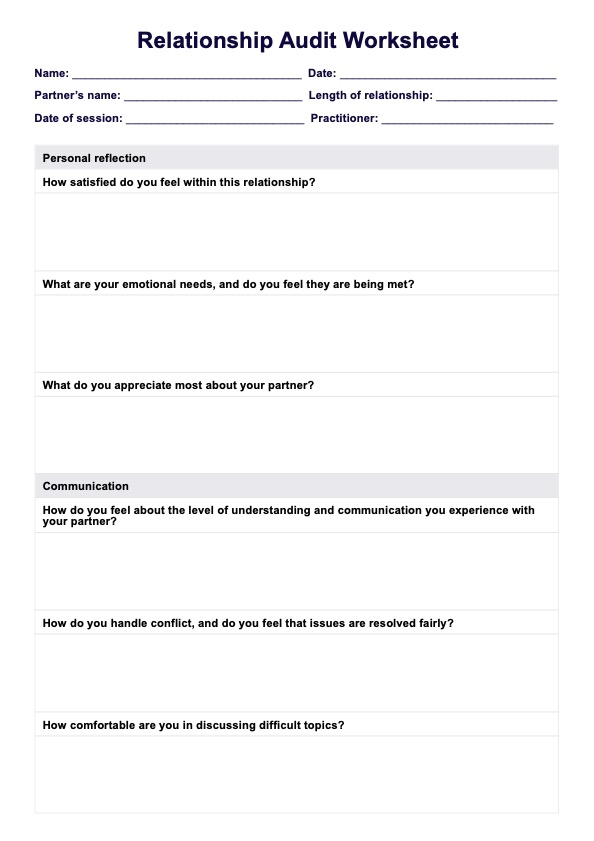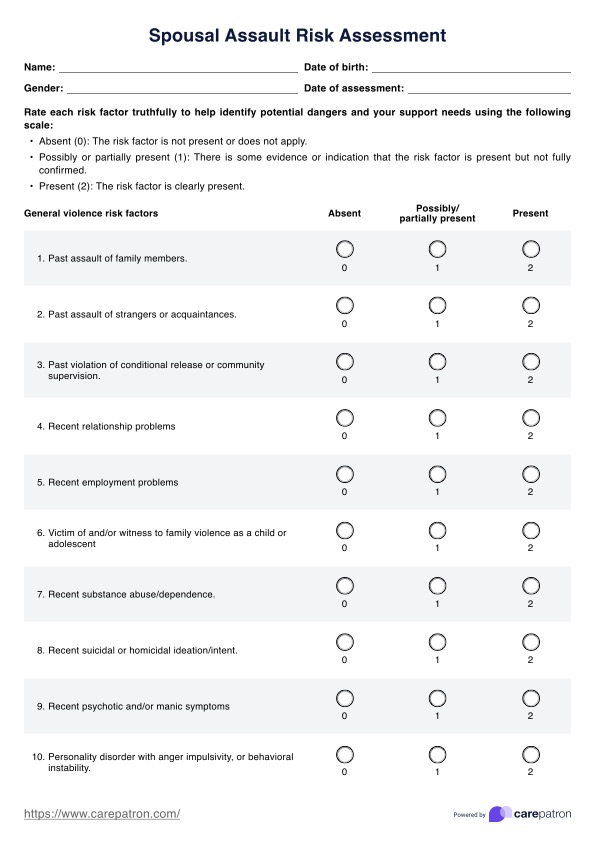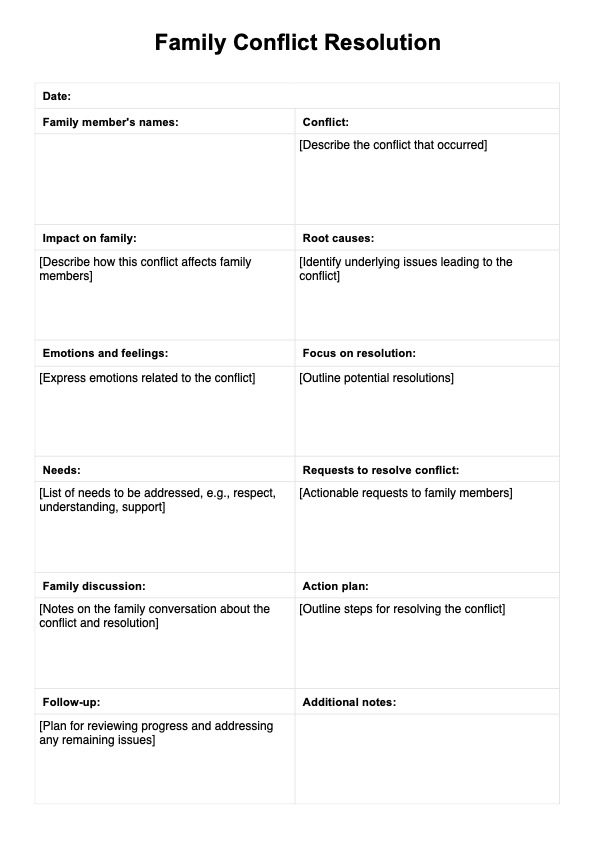Free Printable Values Cards
Discover Free Printable Values Cards to help clients identify what values matter most. Perfect for mental health professionals to enhance therapy sessions.


Importance of determining values
A value is a belief or principle that guides a person's behavior and decisions. When individuals know what they value most, it becomes easier for them to make decisions. However, most people do not regularly reflect on their personal values and desires, so it becomes difficult when they need to make a decision. Determining values is important because they act as an anchor, helping people prioritize and lead their lives with integrity.
Knowing one's values helps shape character and personality. For example, someone who values honesty will strive to be truthful in all situations, while someone who values justice will stand up for what is right. Values like family, friends, and integrity provide a sense of direction and purpose. Identifying and exploring core values enhances relationships and decision-making, leading to a more complete and fulfilling life.
Free Printable Values Cards Template
Free Printable Values Cards Example
What are values cards?
Values cards help people explore and identify what matters most to them. They contain different values like honesty, compassion, and creativity, prompting individuals to reflect on their beliefs and priorities. Using these cards can help people understand what guides their decisions and actions in life.
What is included in the cards?
In our template, each card includes a value and a brief description of its meaning. Blank cards allow clients to add other values they think of while sorting and reconsidering each value's importance in their lives, assisting in a more personalized and meaningful exploration.
How to use our Free Printable Values Cards?
The values cards printable free facilitates self-exploration and values clarification among their clients, supporting therapeutic interventions and personal growth.
Step 1: Download the template
Download the Free Printable Values Cards from the provided link and print them on sturdy cardstock or paper, ensuring print settings maintain the intended size and layout. Encourage clients to cut the cards along the designated outlines or save the customized template electronically for online use during therapy sessions or personal reflection.
Step 2: Reflect on values
Support clients in reviewing their feelings about the values on the cards and selecting those that resonate with them. Discuss the relevance of each value to their life circumstances and therapeutic goals.
Step 3: Arrange and prioritize
Assist clients in arranging their selected values in order of importance or relevance to their therapeutic journey. Encourage them to consider these values and decide whether they are 'very important,' 'important,' or 'not as important.'
Step 4: Regularly update
Encourage them to periodically revisit and update their values cards to reflect their progress in therapy. Also, prompt clients to display their values cards in a visible place as a daily reminder and integrate these reminders into their routines for enhanced therapeutic impact.
Who can use our template?
By using the Free Printable Values Cards, individuals can enhance self-understanding, make more aligned decisions, and foster personal and professional growth.
Therapists
Therapists can use the template during sessions to help clients explore their core values, leading to deeper self-awareness and guiding therapeutic goals. It is beneficial in the early stages of therapy to establish a foundation for personal growth.
Life coaches
Life coaches can incorporate the values cards into their coaching programs to assist clients in aligning their actions with their values. This can be particularly helpful during goal-setting and action planning sessions.
Teachers and educators
Teachers can use the template to teach students to reflect on their values and how they influence their behavior and choices. It's an excellent tool for social-emotional learning activities.
Individuals
Anyone interested in personal development can use the values cards to clarify what truly matters to them. This can be done during significant life transitions or whenever self-reflection and goal-setting are needed.
Acceptance and commitment therapy and values
Developed by psychologist Steven C. Hayes, acceptance and commitment therapy (ACT) is rooted in behavioral and cognitive therapy. The primary aim of ACT is to assist individuals in leading a rich and meaningful life while effectively managing the pain and stress that naturally occur (Hayes et al., 1999). This is achieved through six core processes: cognitive defusion, acceptance, contact with the present moment, observing the self, values, and committed action (Zhang et al., 2018).
ACT helps individuals identify and commit to personal values, aligning their actions with what truly matters to them through mindfulness and acceptance strategies. This process involves mindfulness and self-reflection, which enable individuals to align their actions with their core values, leading to a more fulfilling life. ACT can also lead to improved mental health outcomes, particularly in reducing symptoms of anxiety, depression, and chronic pain (A-Tjak et al., 2015).
References
A-Tjak, J. G. L., Davis, M. L., Morina, N., Powers, M. B., Smits, J. A. J., & Emmelkamp, P. M. G. (2015). A meta-analysis of the efficacy of acceptance and commitment therapy for clinically relevant mental and physical health problems. Psychotherapy and Psychosomatics, 84(1), 30–36. https://doi.org/10.1159/000365764
Hayes, S. C., Strosahl, K., & Wilson, K. G. (1999). Acceptance and commitment therapy: An experiential approach to behavior change. Guilford Press.
Zhang, C.-Q., Leeming, E., Smith, P., Chung, P.-K., Hagger, M. S., & Hayes, S. C. (2018). Acceptance and commitment therapy for health behavior change: A contextually-driven approach. Frontiers in Psychology, 8(2350). https://doi.org/10.3389/fpsyg.2017.02350
Commonly asked questions
Value cards help you identify and understand what is most important to you, making it easier to make decisions and lead a fulfilling life.
You can ask yourself questions like "What qualities do I admire in others?" or "What makes me feel truly happy and satisfied?"
To recognize your values, reflect on past experiences that made you feel proud, happy, or fulfilled, and look for common themes or qualities in those moments.


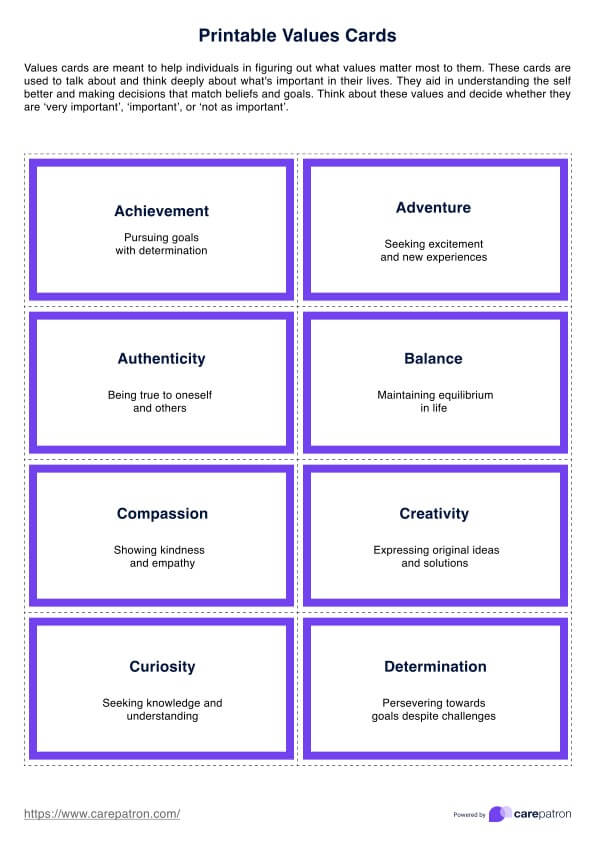
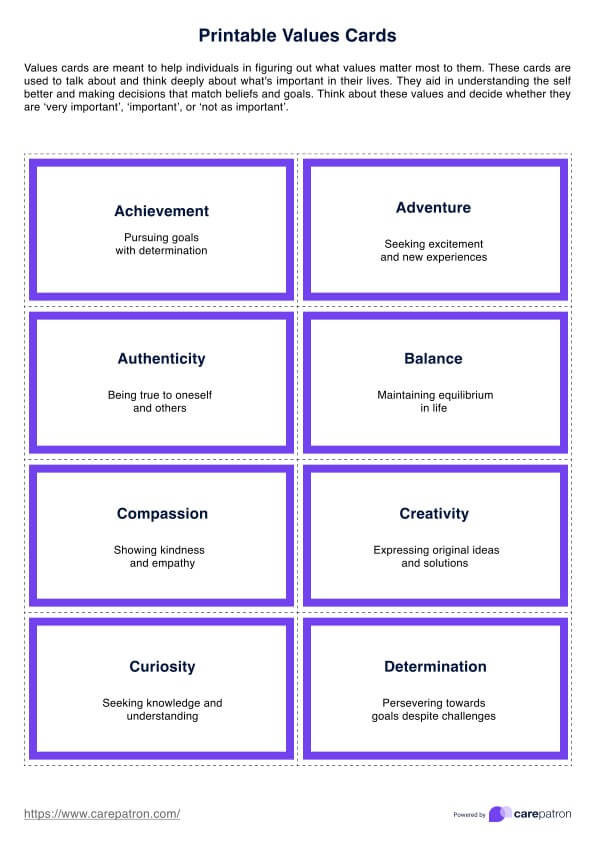
















-template.jpg)


